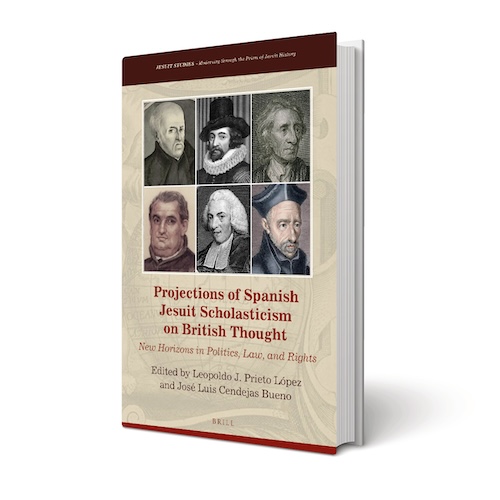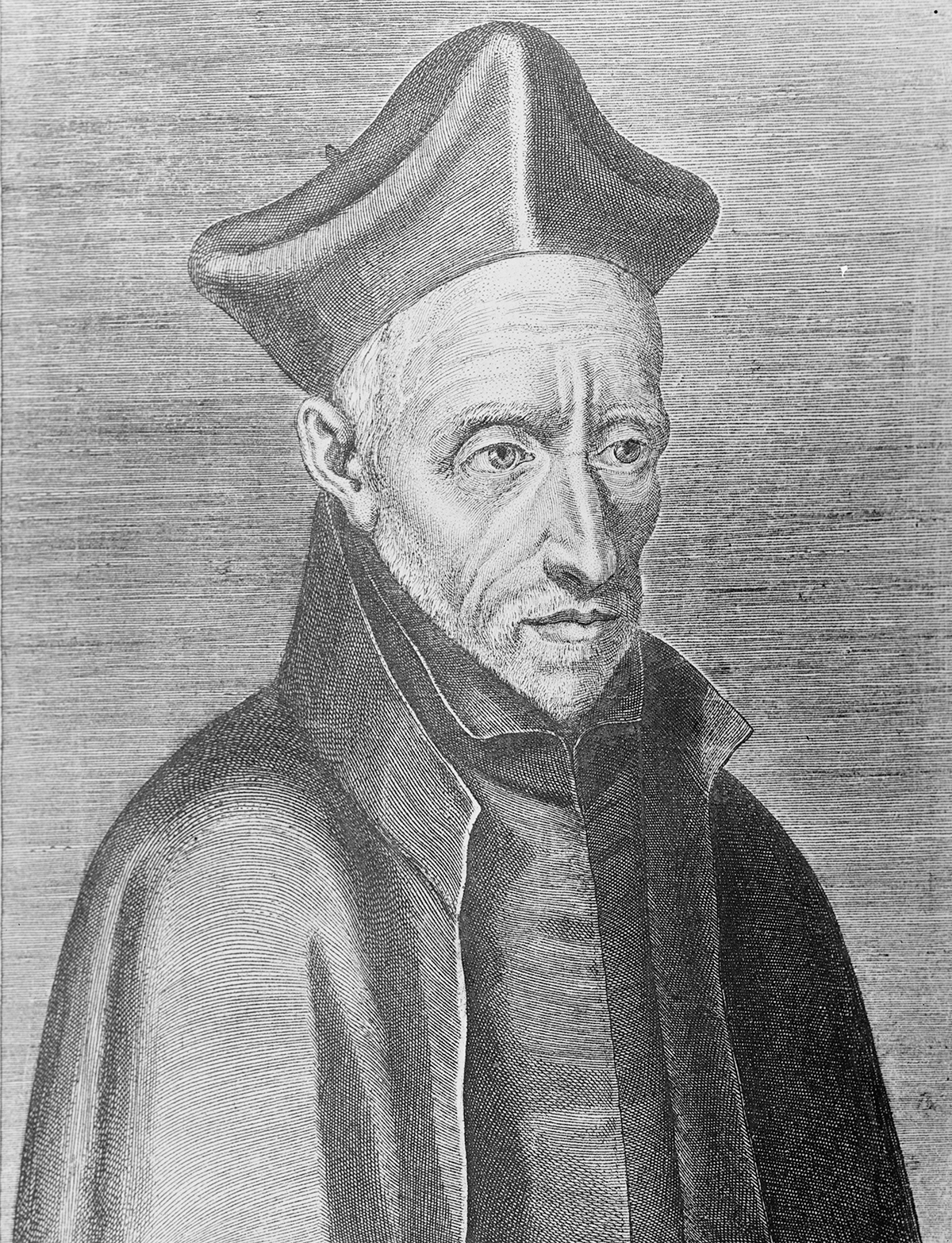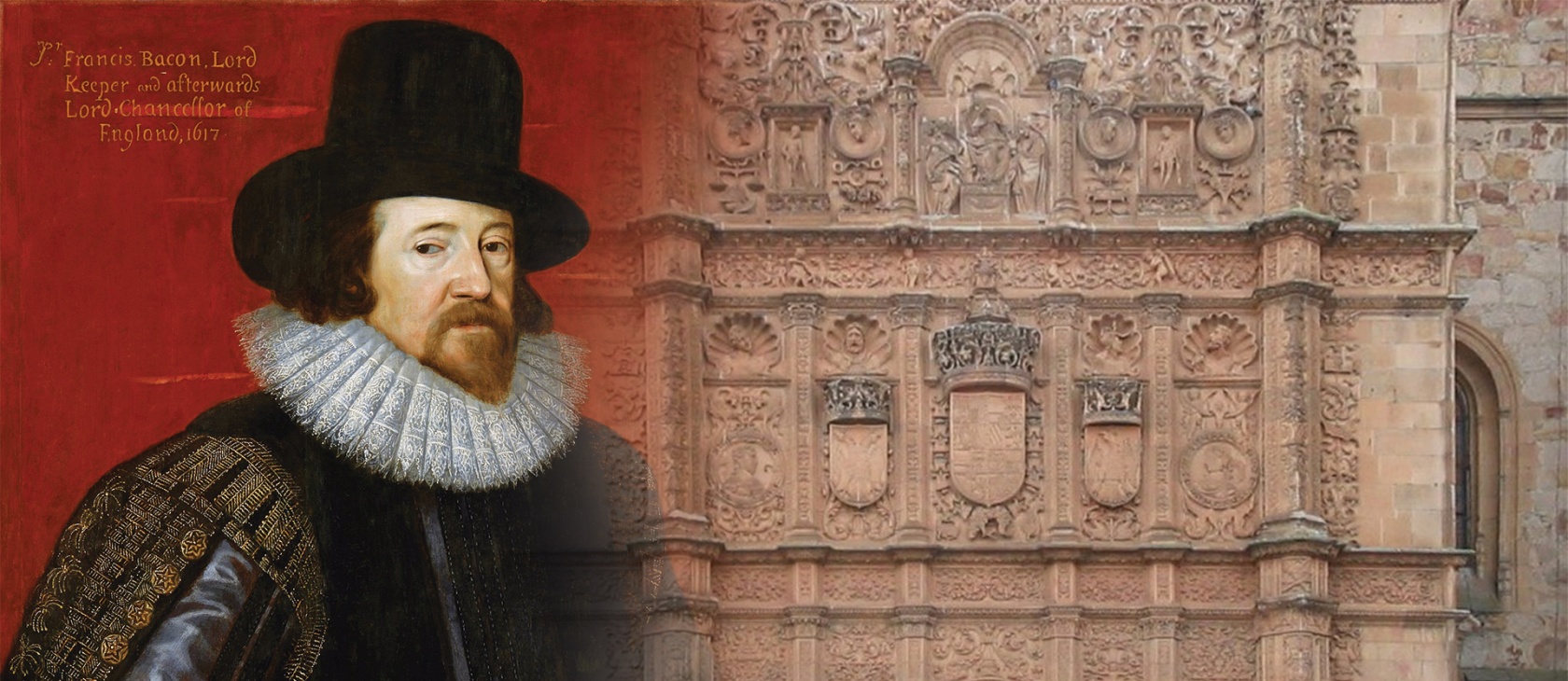According to a still-familiar narrative, European intellectual life before the rise of modern philosophy and science was stagnant, dominated by Scholastics who simply reiterated stale medieval ideas, which were themselves regurgitations of ancient Aristotelian and biblical themes. Individual geniuses like Galileo, Bacon, and Descartes finally dared to sweep aside this intellectual rubbish and build new edifices of thought from scratch.
Did Spanish Scholastic thinkers influence British liberalism more than we think? Yes and no.

Edited by Leopoldo J. Prieto López and José Luis Cendejas Bueno
(Brill, 2023)
This basic story survives in pop intellectual history, but academic historians of thought have long known that it’s a myth. In reality, not only the medievals but also the late Scholastics who mediated their ideas to the early moderns were often men of brilliance and creativity. And in reality, while the early moderns did indeed reject some key ideas of the late Scholastics, they also learned from and built on others. Etienne Gilson was an early expositor of the Scholastic influences on Descartes, and contemporary historians of philosophy such as Dennis Des Chene, Helen Hattab, and Walter Ott have described in detail the complicated relationship between late Scholastic and early modern philosophy. William A. Wallace and Edward Grant are among those who have traced the connections between medieval and modern science.
Another area of Scholastic influence on early modern thought that has attracted contemporary academic interest concerns matters of politics, law, and economics. For example, scholars like Brian Tierney and Annabel Brett have traced the origins of the modern idea of individual rights to medieval canon law and the Dominican thinkers of the Spanish “School of Salamanca.”
Leopoldo Prieto López and José Luis Cendejas Bueno’s anthology, Projections of Spanish Jesuit Scholasticism on British Thought, is an important new contribution to the recovery of this late Scholastic heritage. As the title indicates, the focus is on the Jesuit representatives of late Scholasticism specifically. Most of the essays in the volume pay special attention to Francisco Suárez (1548–1617), though there is also much of interest on other Spanish Jesuits, such as José de Acosta (1540–1600) and Juan de Mariana (1536–1624). On the British side, John Locke (1632–1704) perhaps has the starring role, though several other important thinkers are treated, including Francis Bacon (1561–1626), Algernon Sidney (1622–1683), and Thomas De Quincey (1785–1859). Bringing the story closer to the present day, there is even a treatment of Scholastic influences on Hilaire Belloc (1870–1953), though given his Catholicism, Scholastic influence is less surprising here than it is in the case of the other (Protestant) writers.
Certainly the idea of Bacon and Locke as conduits of Jesuitry into England is jarring. But, of course, influence does not entail agreement, and with some thinkers the influence was not deep in any case, even if not without significance. For example, as one essay in the volume recounts, Bacon respected and made use of Acosta’s work in natural history—in particular, on the climate of the New World, the tides in the Atlantic Ocean, and the like. This was so despite Bacon’s famous hostility toward the Aristotelian conception of nature and of our scientific knowledge of it, which Scholastics like Acosta upheld. But while Bacon’s taking account of a Scholastic’s empirical data is an interesting bit of intellectual history, it does not amount to an influence at the level of philosophical principle. The comparison is nevertheless of value, however, for as the same chapter points out, though the philosophical matrix into which Bacon wanted to fit this empirical data was different from Acosta’s, it was not necessarily as well worked out.
The idea of Bacon and Locke as conduits of Jesuitry into England is jarring.
As another essay in the volume reports, De Quincey, like the Jesuit Scholastics, emphasized the importance of casuistry (the application of general ethical principles to a variety of particular cases) to reasoning about morality, and esteemed these Scholastics’ general project of constructing a casuistic system. All the same, he criticized the specific way they carried out this project. It was in his view too deeply influenced by Catholic considerations, such as the needs of the confessional (where a priest may have to offer the penitent advice related to the specific kinds of sins likely to come up in that context). De Quincey’s own favored approach was guided by the moral system of Immanuel Kant (1724–1804) rather than the natural law theory of the Scholastics. As with Bacon, the Scholastic influence did not run deep, and the differences remain more significant than the commonalities.
Something similar can be said of the Scholastic impact on English mathematician John Wallis (1616–1703), who engaged with Suárez’s views on the relationship between material substance and quantity and borrowed his notion of “distinctions of reason.” Such influence was real but limited. However, there are also cases of stronger continuities between the Jesuit Scholastics and English Protestant thinkers. As is indicated by the subtitle of Prieto López and Cendejas Bueno’s volume (“New Horizons in Politics, Law, and Rights”), it is in political philosophy especially that this Jesuit influence can be felt, and most of the essays are devoted to elaborating on that theme. Here is where Suárez is especially important (as is Robert Bellarmine [1542–1621], albeit he was Italian rather than Spanish). Suárez’s account of resistance to tyranny produced echoes in Sidney. Along with Suárez’s notions of subjective right (the moral claim over what is one’s own or what is owed to one); of the institution of property; and of rulers as properly attaining their offices by popular consent, it also has obvious echoes in Locke. Several essays discuss these parallels in detail.

To some extent these are more than just echoes but reflect the direct influence of Jesuit writers on British thought. Sometimes this fact was wielded as a cudgel, with Tory critics accusing the Whigs of peddling an essentially papist set of doctrines. For that reason, the deployment of ideas like Suárez’s against the absolutism of writers like Robert Filmer was sometimes covert, since open acknowledgement of their Spanish Jesuit provenance would have been politically disadvantageous.
All the same, here, too, it is important to emphasize that there were crucial differences, and not only continuities, between Scholastics like Suárez and Bellarmine on the one hand and the British republican and liberal traditions on the other. For example, Sidney’s account of the human condition is more pessimistic than that of Aristotelian natural law theorists like Suárez, and reminiscent of the state of nature as conceived of by Thomas Hobbes (1588–1679), a “war of every man against every man.” Furthermore, Suárez’s account of the circumstances under which rulers can be resisted is more nuanced and hedged with qualifications than Sidney’s. Sidney, for instance, equates the usurper of political power and the ruler who has become a tyrant, whereas Suárez carefully distinguishes the cases and is much more cautious about resistance to the latter.
Moreover, Suárez maintains the traditional Aristotelian position that society and the governmental authority it requires are natural to human beings rather than the product of contract. The specific form of government and who specifically occupies its offices may be determined by popular consent. But society and government themselves as institutions are not the product of any social contract. Hence Suárez is not committed to a “state of nature” theory of the kind familiar from the liberal tradition in political philosophy.
Despite the liberal influences on Belloc, the harmony between his views and Suárez’s is much greater—unsurprisingly, given that Catholicism and Thomism held even greater sway with him. As an essay in the volume notes, among the themes common to Scholastic writers and Belloc are that social order exists for the sake of perfecting the individuals who make it up, that the rationale of the institution of property relates to the needs of the family specifically, that there is a common good reflective of our nature as social animals that is more than just the aggregate of individual goods, and that the demands of morality and economic rationality are closely linked. These elements of Belloc’s “distributism” contrast with the tendency of liberal writers to think of the individual rather than the family as the basic unit of society, to favor a state that is neutral between the ends individuals might happen to pursue, to deny that the state should pursue a good higher than the aggregate of these ends, and to distinguish questions of economic rationality from questions about morality.
In other ways, too, the extent to which Scholastics like Suárez might be enlisted in the liberal cause—and especially the classical liberal or libertarian cause—should not be exaggerated. A chapter on Suárez’s account of the morality of taxation is instructive. In a detailed treatment, Suárez argues that only the highest authority in a polity, and not intermediate authorities, should impose taxes. And he holds, with qualifications, that taxes must be used for the stated purpose for which they were imposed. On the other hand, he also holds that it is legitimate to tax even the poor for necessary expenses and not just for luxuries, albeit he allows that in practice it is better to avoid doing so when possible. He argues—perhaps surprisingly, given the role he gives to popular consent in choosing a form of government—that the ruler does not need such consent in order to impose a tax. He holds that there is a moral obligation to pay taxes, although he acknowledges the force of the view that such an obligation ceases when taxes are too burdensome. And he argues that, in deciding about whether one is obligated to pay a tax, one should not rely on one’s own judgment but seek the advice of a confessor or another learned and prudent person.
The extent to which Scholastics like Suárez might be enlisted in the liberal cause should not be exaggerated.
Certainly one could take a less austere view of the ethics of taxation, as some in the Scholastic tradition have. But the issue illustrates how the implications of Suárez’s principles in particular, and of those he shares with other Scholastics more generally, are not always obvious where very specific moral questions are concerned.
It goes without saying that the thinkers and themes addressed in Projections of Spanish Jesuit Scholasticism on British Thought are of great significance to the study of modern intellectual history. But it must be emphasized that they are also of more than merely historical interest. In recent years, there has been in conservative intellectual circles an increasingly visible and heated controversy over the nature and merits of the classical liberal tradition. On one side, there are those who take the greatest representatives of classical liberalism—from Locke to Adam Smith to F.A. Hayek—to have made a real advance in our theoretical understanding of human rights and the political and economic orders, which can and should be smoothly incorporated into a genuinely conservative political philosophy. The “fusionism” that has defined much modern American conservatism (which aims to combine religion and traditional morality with a broadly libertarian approach to economics and the functions of government) reflects this point of view.
On the other side, there are conservatives who, while they may acknowledge the virtues of certain institutions that have come to be associated with classical liberalism (such as the rule of law, limited government, and the market economy), do not accept philosophical principles of the kind characteristic of classical liberal political theory. For example, they reject the idea that society and political authority derive from contract or consent rather than nature. And some of them reject, too, the supposition that the state ought ideally to be neutral between religious traditions. This position has come to be known as “postliberalism”—the idea being that liberal principle is not something conservatives should try to conserve but rather something they should work to transcend.
Understanding thinkers like Bellarmine and Suárez is crucial to adjudicating the dispute between the postliberals and their critics. For conservatives sympathetic to classical liberalism, these Scholastics point the way toward combining a traditional Aristotelian and Thomistic natural law approach to ethics and politics with classical liberal principles. For postliberals, by contrast, precisely because these thinkers are pre-liberal, they provide a way of seeing what a post-liberal political philosophy might look like. And insofar as their views would allow us to uphold institutions like the rule of law, private property, limited government, and the like without committing ourselves to the philosophical principles of Locke and company, they indicate that a postliberal politics would not necessarily be an illiberal politics.




